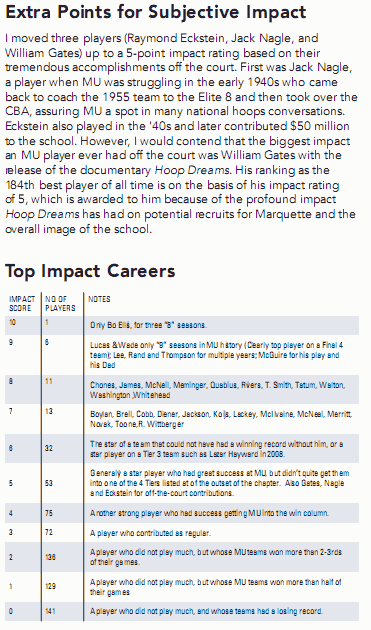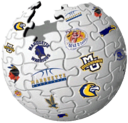Tomorrow, Saturday July 26th, you'll have a chance to meet John Pudner and see a few pages of his new book, Ultimate Hoops Guide: Marquette University.
You know Pudner from his guest columns on Cracked Sidewalks .. Top 100 MU Players of All Time, and Top 20 Recruiting Classes.
We here at Cracked Sidewalks take full credit for inspiring John (Jour '88) to write this book, and are waiting patiently for our royalty checks to start rolling in. (cough)
You can meet Pudner at the Ambassador Hotel, from 8am-12:30pm on Saturday. Signs will direct you. Feel free to tell him how wrong he was on so many of his Top 100 of All Time.
Oh, and click here to pre-order the book. Please. The guy's got NINE kids, for crying out loud. He needs your cash.
Here's his promo material, and a couple pages from the book:




4 comments:
You get credit for inspiring, but the other people who get credit are your readers who gave me about a dozen cases where I had missed the mark in response to the Top 100 columns. By the time I started researching the points they made, particularly on Jim Chones, I was hooked and put in another 700 hours of research and by then I just had to write a book!
As for royalties, the logical publishing plan that was presented to me was they would get a prior order from a school such as Kentucky or UCLA and then me write the pilot book on them. I decided to just become an investor too so I could start writing, so anyone who wants royalities owes me money :-)
Marquette had a wonderful program in the 1960s and 1970s, but the success it enjoyed in the 1970s was the consequence of a far different era in college basketball. Consider for example that:
1) Because Marquette was an independent and most of the nation's powerhouses were conference teams, most of the strong part of the MU schedule was front-loaded. We saw relatively strong teams (i.e., Iowa, Minnesota, Wisconsin, Tennessee, Michigan, South Carolina) usually before Christmas. Otherwise, from early January to early March, the toughest games we had were Notre Dame and DePaul. Everything else was pretty much what we would consider Mid-Major today. It was easier to rack up 25+ win seasons with those kinds of schedules.
2) Marquette's success was in part due to not having the overhand of a tradition of discrimination against minority athletes. Several strong programs of the era, including Louisville, UCLA, North Carolina, were also spportive to African American athletes. At Marquette, McGuire's willingness to recruit regardless of color meant that we were stronger and it meant that when Al walked up to a prospect's door, Al was taken very seriously. By the late 1970s, the discrimination that had plagued college basketball was broken (even in the SEC) and the players Marquette had relatively to itself were being heavily recruited by the Big East teams (which did not exist before 1979).
3) Part of Marquette's success came from the fact that there were comparatively few teams playing high level Division 1 basketball. Through the 1970s, the NCAA was a quaint 24 to 32 team tournament. The first round generally was not competitive and to get to the Final Four required, for MU, three wins and two wins for a conference team. There were probably 100 to 125 Division 1 programs at the time and probably only about 40 that played at a true championship level (which is one of the big reasons UCLA won year after year after year). By contrast, there is probably 300 Division 1 teams today and 75 to 100 that legitimately play at a level worthy of some consideration for a post-season tournament.
In short, there were systematic factors well beyond Marquette's control that made them great in the 1970s. Not that any of us were complaining, but I will suggest the schedule is a lot tougher today; more teams compete for a comparable number of athletes; and, the challenge of the NCAA is as tough as ever. Given the comparative level of competition, in some ways the Dwayne Wade Final Four in 2003 was a tougher accomplishment than the NCAA Championship in 1977. I'll take 'em both, I might add.
I do agree completely, and that is part of why I believe the current guys are underrated by many. I love the NIT champs obviously, but they did not play a single ranked team - again not complaining - but the current guys have beaten 10 ranked teams in three years. Only the 1994-96 team beat more top 10 teams. Thanks for all of you that came or have bought books, I got a call from the publisher to say that on-line sales were really starting to pop, so those books will be to you in a couple of weeks and I plan to be back on campus before long.
Thanks for the agreement and I second your thought about how tough, all-in, this current crop of Warriors has been. I would add though that one of the great mysteries in life is why the Jesuits-in-charge let the program go to the dogs -- or the Dukiets -- in the 1980s.
One of the truly boneheaded decisions Marquette ever made was first retaining and then sticking with Hank Raymonds. Hank was and is a wonderful man who was a great assistant coach. He had no business replacing Al. And when the program eroded beginning in the early 1980s and reached rock bottom by the late 1980s, the university did a typically Catholic thing and blamed everyone but themselves.
Coming off an NCAA Championship and the best record except for UCLA in the decade, Marquette could have had anyone they wanted except, perhaps, Dean Smith. Instead, they hired Hank and began a 15-year downward spiral and 25 years of malaise that only now is truly in process of being turned around.
North Carolina honored Dean Smith Assistant Bill Gutridge by making him head coach when Dean retired. Somewhere along the line, somebody got smart and realized they weren't going to be at a championship level with Gutridge at the controls and honorably and classily replaced him. By 1981, Marquette should have done the same with Hank.
The good news is that we're off to a red hot start with Coach Buzz Williams. If he can coach half as well as he appears to be recruiting, the succession problem won't be an issue this time.
Post a Comment